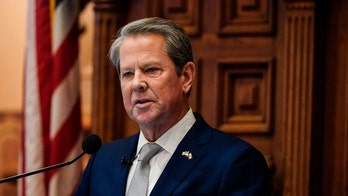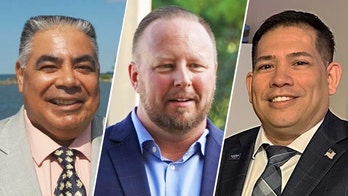GOP Race Careens into South Carolina
"I've raised the question, which I think is a totally legitimate question, what about some companies that Bain took over that went bankrupt. And all I've said is, you know, this isn't about free enterprise. I mean, this is one of those phony efforts to throw up a smokescreen. This isn't about capitalism. This isn't even about private equity funds. This is about one person who wants to be president of the United States."
-- Newt Gingrich "On the Record with Greta Van Susteren."
In an exchange with a South Carolina voter who asked Newt Gingrich to lay off his attacks on frontrunner Mitt Romney's record at Bain Capital, the former House speaker revealed one of the central problems of his campaign: he can't decide if he's the candidate or chief strategist.
Gingrich, who has advised his fellow Republicans for years on how to win races and worked as a political analyst for Fox News, heard the thoughtful criticism of his anti-Bain crusade from voter Dean Glossup in Spartanburg and responded by saying that Glossup was right because whatever the Gingrich campaign and super PAC did on the subject would be distorted by the "class warfare" effort being waged by President Obama.
Gingrich is probably right. For him and Texas Gov. Rick Perry, the nuanced differences between their attacks on Romney and the Occupy Wall Street-inspired rhetoric of the Obama Democrats, are lost when rinsed through the media spin cycle. The way it looks is that two struggling candidates are joining the anti-capitalist chorus against a successful businessman. It smacks of envy and despair.
But, the line of attack is also the most lethal one to deploy against Romney.
As Henry Ford said, "A business that makes nothing but money is a poor business." While Republicans may love successful businessmen like Fred Smith of FedEx and even admire liberal entrepreneurs like the late Steve Jobs, the parasite and scavenger are not high on their list of respected professions. If Romney gets painted as a leech, he's done for, whether now or in the general election against Obama.
But by raising this topic and bringing pitchfork populism to the GOP process, Gingrich and Perry may end up being detested by the very voters whose support they seek. And with Ron Paul standing by to absorb pro-capitalist, anti-Romney protest votes, Gingrich and Perry could be headed off a cliff.
But if they mean to win, it may be their last chance to stop Romney since South Carolina has been so badly hurt by the ruination of American manufacturing.
Perry, having decided to pursue the line of attack on Romney, is sticking to his guns. In his speeches and interviews, he allows no notion to creep in that what he's doing is reckless or wrong or strengthening the hand of the Obama Democrats in the fall. Having chosen his course, Perry aims to see it through.
Gingrich, however, winces at the idea that the final chapter in his unlikely presidential quest would be written about a temper tantrum in South Carolina in which Gingrich, stung by Romney's ripping of his record in Iowa, launched a kamikaze strike on the frontrunner.
Remember, that Gingrich's rebound came as a result of the affection and appreciation Republican voters had felt for him in his avuncular encouragement to his fellow candidates to save the roughest stuff for Obama. He taught the rest of the field how to debate and parry reporter's questions. When Romney smacked down questions about banning birth control from ABC News in the network's New Hampshire debate, he was channeling the former speaker.
Gingrich's finest hour may have been his two-man debate with Herman Cain, already mortally wounded but still defiant, in which Gingrich seemed to be trying to help and encourage the doomed former frontrunner.
At the time, it seemed like the former speaker's path was not to the nomination, but to spending his sunset years as the grand old man of the Grand Old Party. That's been eradicated by his blood feud with Romney, and Gingrich likely knows it.
While Perry is willing to see his strategy through, knowing that he can return to Texas when this is through, Gingrich is jeopardizing his former life and future prospects with this line of attack in South Carolina.
It may serve Romney well to come up with an actual defense to these attacks now. It may make him a stronger candidate later on, but it seems unlikely to win Gingrich the nomination or the gold watch he once sought.
The big test for Gingrich comes at the Fox News/South Carolina GOP debate on Monday. Is Gingrich prepared to see his strategy through even if it risks him becoming a pariah?
An Incumbent With a Quarter-Billion Dollars Runs as the Underdog
"If you're willing to work even harder in this election than you did in the last election, I promise you, change will come."
-- President Obama speaking at a fundraiser at the University of Illinois at Chicago.
President Obama's fundraising haul for the final quarter of 2011, in which his cash collection was interrupted by fighting with Congress and a Christmas vacation, was $68 million.
The number has dropped each quarter, but with so much lead time to raise cash, Obama managed raise a $224 million for himself and his ground troops at the Democratic National Committee in 2011.
By comparison, the Obama campaign and the DNC in the fourth quarter out-raised Republican frontrunner Mitt Romney and the Republican National Committee by at least $20 million. Romney will have an easier time of fundraising now, especially if the GOP field shrinks after South Carolina, but there's little doubt that the Blue Team will have a cash advantage.
The Obama campaign is urging donors to coughing up and not get complacent. It's echoed in Obama's remarks about the challenge of change and that reforming America being a multi-term proposition.
Obama erred badly when early on, assuming a typical economic recovery, he bluffed about delivering a turnaround in one term or being defeated, or, even worse, his swaggering line about being a great "one-term president" than a mediocre two-term president.
Back in those days, Obama was damning the torpedoes and ramming full speed into health care legislation, overhauling the auto and financial sectors and appointing liberal justices to the Supreme Court. Obama cast himself as a major pivot point in history -- as the vice president might say, a big effing deal.
But with the recovery not forthcoming, Washington more dysfunctional than ever and Obama's biggest effing deal of all -- the health law -- in disrepute and legal danger, the president has changed course to cast himself as an underdog incumbent with much work left to do.
Part of this is because complacency and low enthusiasm are huge risks for Democrats in this cycle, but also because if the strategy succeeds, it will take attention away from the big ticket items of Obama's term.
Obama's big moves -- his first stimulus, his takeover at GM and Chrysler, his health law, his bank regulations -- were history-making acts and he is the hugely well funded incumbent president of the United States. Obama, though, wants voters to forget about the past and focus on the future.
Who You Callin' Establishment, Dude?
"It sounds pretty strange when the former House speaker (Mr. Gingrich), the former No. 3 in the Senate Republican leadership (Mr. Santorum), a past chairman of the Republican Governors Association (Mr. Perry), and a former vice-presidential chief of staff (William Kristol) and others warn against letting ‘the establishment' choose the Republican nominee. If there is a ‘GOP establishment,' they are surely part of it."
-- Karl Rove, former senior White House adviser to President George W. Bush, writing in The Wall Street Journal.
And Now, A Word From Charles
"But the big story is I think Ron Paul. He got 21 percent in Iowa, 23 percent in New Hampshire. He's got between a quarter and a fifth of the vote. He has a stable, energetic constituency. He is not out for the presidency. He's 76. He, himself, has said he doesn't see himself in the Oval Office. He is the leader of a movement, or as he said last night, the cause. And he is now the champion of a cause on the upswing.
"I mean he is going to stay in the race. He is not going to drop out. He will end up in Tampa with perhaps the second most delegates. He will be like Jesse Jackson was in the '80s among the Democrats and Buchanan was in '92, leader of the eternal opposition, the man who brought libertarianism out of the wilderness, all those pathetic third-party runs, into a position at Tampa where he can negotiate for changes in policy and even a speaking role, perhaps even on prime time. That is a historic achievement."
-- Charles Krauthammer on "Special Report with Bret Baier"




